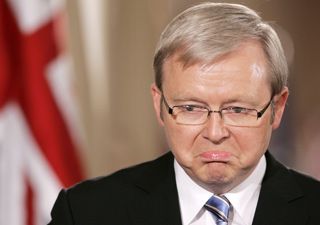Julia Gillard may have triumphed over Kevin Rudd in Labor’s leadership brawl. But Labor remains headed for electoral oblivion—and it is Gillard’s policies that are to blame. It would have been no better if Rudd had won.
The leadership battle simply exposed Labor’s political bankruptcy. There was barely a cigarette paper of difference between the two candidates. Gillard has continued Rudd’s policies virtually unchanged—hardly a surprise considering she helped develop them as part of Rudd’s “kitchen cabinet” when he was Prime Minister.
There was a real mood for change when Labor won office in 2007. While there is still popular support for boosting social services spending, reining in the power of big business and for action on climate change, the hope that Labor might deliver is evaporating.
Labor’s total commitment to neo-liberal budget discipline means it is incapable of seriously boosting spending on public services. Instead, its goal is to produce a budget surplus. But as falling company profits cut into government tax revenue, it is more and more likely that Wayne Swan will be cutting services to deliver that surplus.
Swan may have written in The Monthly about his concern at the “rising power of vested interests” and mining magnates like “the Gina Rineharts and the Clive Palmers”. But he is not prepared to take on the mining bosses.
If Swan was willing to increase the mining tax to its original level, he could raise $60 billion extra in its first eight years, according to the Treasury Department.
Gillard claims she is the one capable of delivering reforms and “getting things done”. Really? For all her talk about a commitment to education, when the Gonski review into schools funding recommended a $5 billion a year funding boost, Gillard refused to commit to it, in case it affected the budget surplus.
Understandably there was sympathy for Rudd in the leadership fight—since anyone but Gillard seems a better bet if Labor is to beat Abbott at the next federal election. But it was wishful thinking. Rudd’s main pitch for the leadership was not policy, but how badly he had been treated. When he was Prime Minister Labor’s ratings were also in free fall.
The leadership fiasco also confirmed the decline of the Labor Left. Rather than offer some policy alternative, Labor Left MPs like Doug Cameron lined up uncritically behind Rudd, while some others lined up behind Gillard.
Labor’s embrace of neo-liberalism has hollowed out the party and shattered its working class support base. Its membership is in freefall—now at 31,000 down from just under 50,000 immediately after Labor came to power in 2007. Its support in working class communities has hit rock bottom too.

Where are The Greens?
A left alternative is badly needed in Australian politics. The Greens could have used Labor’s leadership crisis to slam their unpopular policies and put forward policies worth fighting for. They could have called on Labor to tax the rich, fund public education, scrap anti-union laws, close the refugee detention centres and introduce same-sex marriage.
Instead they were tarred with the same electoral brush, telling the media how great their working relationship with Julia Gillard has been. Greens leader Bob Brown told reporters, “We signed a very beneficial arrangement with Julia Gillard and its produced dividends”. The Greens have been so concerned to prove their positive parliamentary credentials, they have been pulled into defending the government.
Building a fighting alternative
The left alternative is going to come from outside parliament. The strike campaign by nurses in Victoria has shown how to fight cuts to the public sector (see opposite page). Their defiance of Fair Work orders should be an encouragement to other unions and campaigners.
In Sydney, MUA members also showed it was possible to defy Fair Work and take the fight to job-cutting, union-busting bosses.
In Queensland’s Bowen basin, coal miners are showing the real power that can fight austerity with their week-long strike against BMA (BHP Billiton Mitsubishi Alliance) over contracting, job security, cheaper housing and union control on the job. A vote to go on strike was won 2500 to two. They’ve shown how to really stand up to the mining bosses.
It’s this kind of power that can stop the public service cuts in NSW, the job losses at Sydney University, and strike down the remainder of the ABCC.
And it’s this kind of power we can look to in the fight for a socialist alternative to capitalism’s crisis—a world where the wealth in society is controlled by those who create it, not by vested interests and the “Gina Rineharts and Clive Palmers”.





